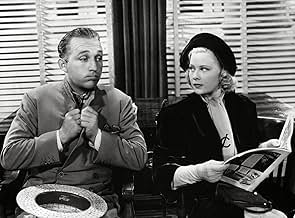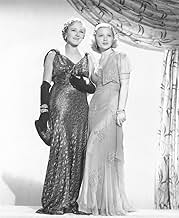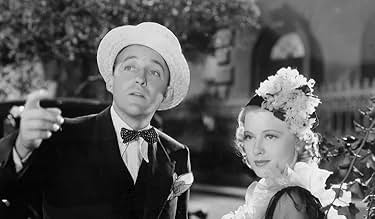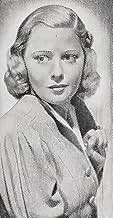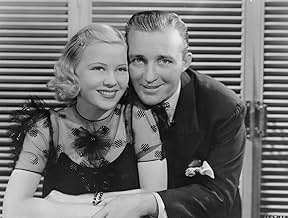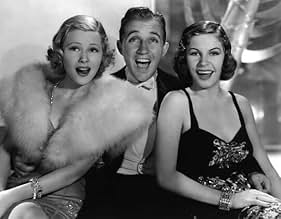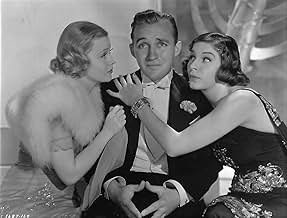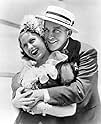अपनी भाषा में प्लॉट जोड़ेंAccording to the will of an eccentric millionaire, one of four randomly chosen strangers will become his heir if he/she can double $5000 by honest means.According to the will of an eccentric millionaire, one of four randomly chosen strangers will become his heir if he/she can double $5000 by honest means.According to the will of an eccentric millionaire, one of four randomly chosen strangers will become his heir if he/she can double $5000 by honest means.
फ़ीचर्ड समीक्षाएं
Bing Crosby croons his way effortlessly through this little romp, while Martha Raye and Andy Devine provide the comedy, cloyingly at times. The plot, intriguing if not original, involves a dying millionaire who instructs his lawyers to drop twenty-five wallets containing a $100 bill on the streets of New York City in order to find honest people who will attempt to return them to their owner. Each winner is then given $5,000, and the first one to double that money within 30 days will receive the entire estate: $1 million. The plot is frequently interrupted by musical interludes, since Crosby plans to double his money by opening a nightclub.
... from Paramount Pictures and director Theodore Reed. When an eccentric millionaire dies, his will instructs his executors to plants purses and wallets containing $100 around the city. Anyone who returns the items to the address enclosed gets to participate in the next aspect of the will. They are each given $5000 in cash and have one month to double the amount through any reputable means (which excludes "gambling and speculation"). The first one to do so inherits the entirety of the deceased's estate, valued at over $1 million. If none of the people can double their money, then the deceased's cynical brother inherits it all. Only 4 people return the initial $100: singer Lefty (Bing Crosby), businessman John (William Frawley), layabout Half-Pint (Andy Devine), and obnoxious showgirl Liza Lou (Martha Raye). While the four try to double their money, the brother (Samuel S. Hinds) and his family try to stop them from succeeding. Also featuring Mary Carlisle, Benny Baker, William Henry, Fay Holden, Bert Hanlon, Gilber Emery, William Kingsford, and John Gallaudet.
Bing sings several songs, Martha Raye sings a couple, and there's a lengthy nightclub act sequence near the end, including a humorous slapstick dance from Ames & Arno. The cast is appealing, although Raye can be like nails on a chalkboard, which I know is intentional, but at times she's too successful. This is a pleasant time-waster, but nothing memorable.
Bing sings several songs, Martha Raye sings a couple, and there's a lengthy nightclub act sequence near the end, including a humorous slapstick dance from Ames & Arno. The cast is appealing, although Raye can be like nails on a chalkboard, which I know is intentional, but at times she's too successful. This is a pleasant time-waster, but nothing memorable.
The story is contrived and start-stop-start in places, the night-club sequence has a lot of great touches but is perhaps overlong and the donkey-dressed stuntman was odd and unnecessary. Double or Nothing still makes for pleasant viewing. The sets are lavish, especially the lake set in It's On, It's Off, and the photography and direction are straightforward and efficiently organised. The music score has the right amount of lushness, energy and whimsy, complete with some fitting classical music, and the songs are great though not among the greatest tunes of any Bing Crosby film. The standouts are It's On, It's Off, Smarty and especially the heavenly The Moon Got in My Eyes. The choreography is lively and cleverly done, the water ballet forming It's On, It's Off is the most memorable but Ames and Amos' tango and the slow motion fight are worth looking out for as well. The dialogue crackles with wit and fits the term escapist entertainment just fine. There is a fair bit of nonsense in the goings-on but it is pleasant and part of the fun. Bing Crosby looks very comfortable here and his voice is as handsome as ever, The Moon Got in My Eyes is sung so beautifully by him and suits him like a glove. Mary Carlisle is charming, Andy Devine is amusing and William Frawley likewise. Martha Raye won't be for all tastes, her comedy can be quite farcical and not in the most subtle of ways but she looks as though she's having a whale of a time and despite having more to do she's not as emphatic as she was in Waikiki Wedding(though she was still fun in that too). Overall, good pleasant fun. 7/10 Bethany Cox
Among a slew of films Bing Crosby made for Paramount in the mid-thirties,"Double or Nothing" is a reminder that Bing Crosby was more than just a crooner. He had a flair for acting, a natural easy-going charm that came through on screen. In this cleverly contrived tale, he's one of four candidates for a fortune who's challenged to take a wad of cash and double it in thirty days. That's a headache for heiress Mary Carlisle who -- and this should come as no surprise -- ultimately falls for him. Martha Raye, Andy Devine and William Frawley as Bing's fellow fortune-hunters contribute stereotypical schtick, leading up to a night at an unlikely night club and an even less probable scenery-shifting send-off. Okay, the movie doesn't always make sense. But a good yarn, bright, brash dialogue and the youthful Bing make it fun to watch.
Twenty Five wallets with a hundred dollar bill and the business card of a lawyer's office are dropped around a city. Only four people find those wallets and go to the attorney's office to return them.
They don't know it, but the four honest ones have just entered a sweepstakes of sorts. According to the terms of a will by an eccentric millionaire, these four are given five thousand dollars and are given a month to double it. The first one who does becomes the heir to a fortune. Otherwise the money goes to the deceased's brother, Samuel S. Hinds and his family.
When the four people are Bing Crosby, Andy Devine, Martha Raye, and William Frawley you just look at the billing to see who will be the winner. But you are in for an enjoyable ride along the way to see who wins and to see Bing get the girl who in this case was his most frequent screen partner of the 1930s, Mary Carlisle.
In the 1930s rich people on screen were either kind and beneficent or were like Samuel S. Hinds, worth millions themselves and wanting more. They weren't called robber barons for nothing. Hinds and his family which include wife Fay Holden, and offspring Mary Carlisle and William Henry all throw big roadblocks into the paths of our intrepid would be heirs.
Another reviewer mentioned that casting Samuel S. Hinds as the unscrupulous businessman was offbeat. Hinds, who's best known on screen as George Bailey's father Peter in It's A Wonderful Life, gave a good account of himself here in a change of pace. Equally offbeat though was Fay Holden, best known as Andy Hardy's mother who is equally good in aiding and abetting Hinds's nefarious schemes.
Paramount gave some good songs for Crosby to sing. The biggest hit out of this film was The Moon Got In My Eyes which sold a few 78 platters back in the day. But in the staging of them, they were light years behind MGM and Warner Brothers during the thirties. In fact one of the songs, All You Want to Do Is Dance, the staging is a total ripoff of what MGM had done a year earlier in Born to Dance with James Stewart and Eleanor Powell singing and dancing to Cole Porter's Easy to Love. Crosby's other two numbers, Smarty and It's the Natural Thing to Do, suit his style perfectly.
Bing Crosby's Rhythm on the Range had introduced Martha Raye to the screen a year earlier and she repeated her brand of wackiness here. She pairs off nicely against Andy Devine, their styles contrast each other well.
William Frawley showed up in several Crosby pictures at Paramount, most notably in Going My Way as the music publisher who buys Father O'Malley's "mule". He also guested a couple of times on Bing's radio show, Kraft Music Hall. Offscreen Frawley was a mean, nasty, misanthropic drunk who eventually alienated one and all in Hollywood. He was on his uppers when Desi Arnaz rescued him to play neighbor Fred Mertz in his new series I Love Lucy. Probably extended Frawley's life as well as career.
Double Or Nothing is a great example of a vehicle that Paramount asked Bing Crosby to carry on the strength of his not inconsiderable charm. Backed by a good cast of supporting players, he does so here with one hand tied behind his back. Bing was up to more challenging material and gradually he got it.
They don't know it, but the four honest ones have just entered a sweepstakes of sorts. According to the terms of a will by an eccentric millionaire, these four are given five thousand dollars and are given a month to double it. The first one who does becomes the heir to a fortune. Otherwise the money goes to the deceased's brother, Samuel S. Hinds and his family.
When the four people are Bing Crosby, Andy Devine, Martha Raye, and William Frawley you just look at the billing to see who will be the winner. But you are in for an enjoyable ride along the way to see who wins and to see Bing get the girl who in this case was his most frequent screen partner of the 1930s, Mary Carlisle.
In the 1930s rich people on screen were either kind and beneficent or were like Samuel S. Hinds, worth millions themselves and wanting more. They weren't called robber barons for nothing. Hinds and his family which include wife Fay Holden, and offspring Mary Carlisle and William Henry all throw big roadblocks into the paths of our intrepid would be heirs.
Another reviewer mentioned that casting Samuel S. Hinds as the unscrupulous businessman was offbeat. Hinds, who's best known on screen as George Bailey's father Peter in It's A Wonderful Life, gave a good account of himself here in a change of pace. Equally offbeat though was Fay Holden, best known as Andy Hardy's mother who is equally good in aiding and abetting Hinds's nefarious schemes.
Paramount gave some good songs for Crosby to sing. The biggest hit out of this film was The Moon Got In My Eyes which sold a few 78 platters back in the day. But in the staging of them, they were light years behind MGM and Warner Brothers during the thirties. In fact one of the songs, All You Want to Do Is Dance, the staging is a total ripoff of what MGM had done a year earlier in Born to Dance with James Stewart and Eleanor Powell singing and dancing to Cole Porter's Easy to Love. Crosby's other two numbers, Smarty and It's the Natural Thing to Do, suit his style perfectly.
Bing Crosby's Rhythm on the Range had introduced Martha Raye to the screen a year earlier and she repeated her brand of wackiness here. She pairs off nicely against Andy Devine, their styles contrast each other well.
William Frawley showed up in several Crosby pictures at Paramount, most notably in Going My Way as the music publisher who buys Father O'Malley's "mule". He also guested a couple of times on Bing's radio show, Kraft Music Hall. Offscreen Frawley was a mean, nasty, misanthropic drunk who eventually alienated one and all in Hollywood. He was on his uppers when Desi Arnaz rescued him to play neighbor Fred Mertz in his new series I Love Lucy. Probably extended Frawley's life as well as career.
Double Or Nothing is a great example of a vehicle that Paramount asked Bing Crosby to carry on the strength of his not inconsiderable charm. Backed by a good cast of supporting players, he does so here with one hand tied behind his back. Bing was up to more challenging material and gradually he got it.
क्या आपको पता है
- ट्रिवियाOne of over 700 Paramount Productions, filmed between 1929 and 1949, which were sold to MCA/Universal in 1958 for television distribution, and have been owned and controlled by Universal ever since; its earliest documented telecast took place in Seattle Tuesday 25 November 1958 on on KIRO (Channel 7); it was released on DVD 14 November 2006 as one of 5 titles in Universal's Bing Crosby Screen Legend Collection, and again 11 November 2014 as one of 24 titles in Universal's Bing Crosby Silver Screen Collection.
- भाव
Jonathan Clark: Will you have a cocktail?
Liza Lou Lane: No. No alcohol, kid. I get a feelin'z good.
Vicki Clark: What's the matter with feeling good?
Liza Lou Lane: Oh, you don't know how good I can feel.
- साउंडट्रैकDouble or Nothing
(uncredited)
Lyrics by Johnny Burke
Music by Victor Young
Played and sung by vocal group during opening credits.
Reprised at the Four Winds Club opening
टॉप पसंद
रेटिंग देने के लिए साइन-इन करें और वैयक्तिकृत सुझावों के लिए वॉचलिस्ट करें
विवरण
- रिलीज़ की तारीख़
- कंट्री ऑफ़ ओरिजिन
- भाषा
- इस रूप में भी जाना जाता है
- Hjärtats nyckel heter sång
- फ़िल्माने की जगहें
- उत्पादन कंपनी
- IMDbPro पर और कंपनी क्रेडिट देखें
- चलने की अवधि
- 1 घं 30 मि(90 min)
- रंग
- पक्ष अनुपात
- 1.37 : 1
इस पेज में योगदान दें
किसी बदलाव का सुझाव दें या अनुपलब्ध कॉन्टेंट जोड़ें

